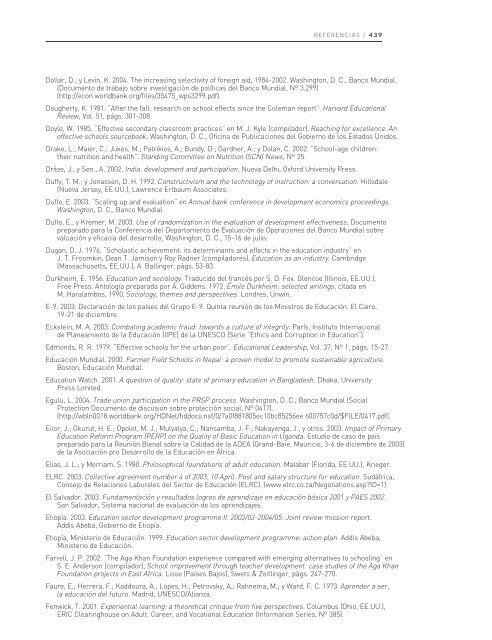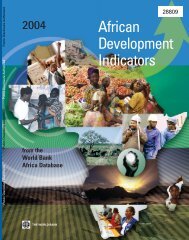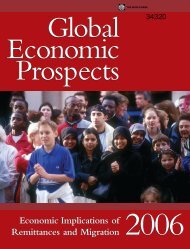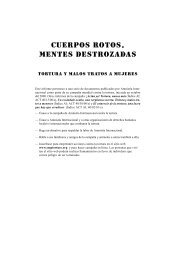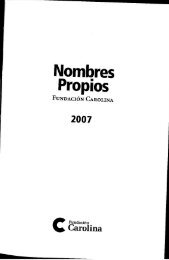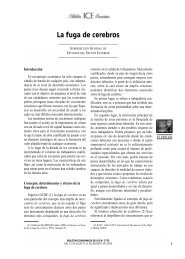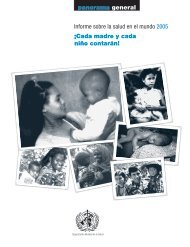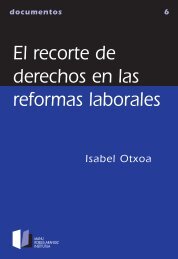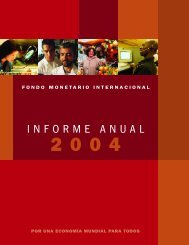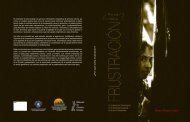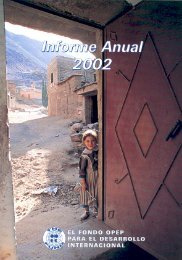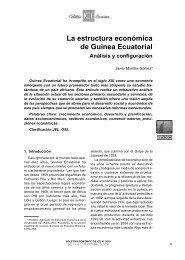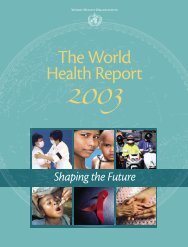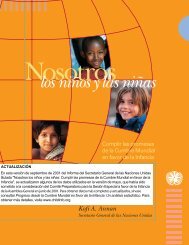Educación para todos: el imperativo de la calidad; Informe ... - eFaber
Educación para todos: el imperativo de la calidad; Informe ... - eFaber
Educación para todos: el imperativo de la calidad; Informe ... - eFaber
- No tags were found...
You also want an ePaper? Increase the reach of your titles
YUMPU automatically turns print PDFs into web optimized ePapers that Google loves.
REFERENCIAS / 439Dol<strong>la</strong>r, D.; y Levin, K. 2004. The increasing s<strong>el</strong>ectivity of foreign aid, 1984-2002. Washington, D. C., Banco Mundial.(Documento <strong>de</strong> trabajo sobre investigación <strong>de</strong> políticas d<strong>el</strong> Banco Mundial, Nº 3.299)(http://econ.worldbank.org/files/35475_wps3299.pdf).Dougherty, K. 1981. “After the fall: research on school effects since the Coleman report”. Harvard EducationalReview, Vol. 51, págs. 301-308.Doyle, W. 1985. “Effective secondary c<strong>la</strong>ssroom practices” en M. J. Kyle (compi<strong>la</strong>dor), Reaching for exc<strong>el</strong>lence. Aneffective schools sourcebook. Washington, D. C., Oficina <strong>de</strong> Publicaciones d<strong>el</strong> Gobierno <strong>de</strong> los Estados Unidos.Drake, L.; Maier, C.; Jukes, M.; Patrikios, A.; Bundy, D.; Gardner, A.; y Do<strong>la</strong>n, C. 2002. “School-age children:their nutrition and health”. Standing Committee on Nutrition (SCN) News, Nº 25.Drèze, J.; y Sen., A. 2002. India: <strong>de</strong>v<strong>el</strong>opment and participation. Nueva D<strong>el</strong>hi, Oxford University Press.Duffy, T. M.; y Jonassen, D. H. 1992. Constructivism and the technology of instruction: a conversation. Hillsdale(Nueva Jersey, EE.UU.), Lawrence Erlbaum Associates.Duflo, E. 2003. “Scaling up and evaluation” en Annual bank conference in <strong>de</strong>v<strong>el</strong>opment economics proceedings.Washington, D. C., Banco Mundial.Duflo, E.; y Kremer, M. 2003. Use of randomization in the evaluation of <strong>de</strong>v<strong>el</strong>opment effectiveness. Documentopre<strong>para</strong>do <strong>para</strong> <strong>la</strong> Conferencia d<strong>el</strong> Departamento <strong>de</strong> Evaluación <strong>de</strong> Operaciones d<strong>el</strong> Banco Mundial sobrevaluación y eficacia d<strong>el</strong> <strong>de</strong>sarrollo, Washington, D. C., 15-16 <strong>de</strong> julio.Dugan, D. J. 1976. “Scho<strong>la</strong>stic achievement: its <strong>de</strong>terminants and effects in the education industry” enJ. T. Froomkin, Dean T. Jamison y Roy Radner (compi<strong>la</strong>dores), Education as an industry. Cambridge(Massachusetts, EE.UU.), A. Ballinger, págs. 53-83.Durkheim, E. 1956. Education and sociology. Traducido d<strong>el</strong> francés por S. D. Fox. Glencoe (Illinois, EE.UU.),Free Press. Antología pre<strong>para</strong>da por A. Gid<strong>de</strong>ns, 1972, Émile Durkheim: s<strong>el</strong>ected writings, citada enM. Hara<strong>la</strong>mbos, 1990, Sociology, themes and perspectives. Londres, Unwin.E-9. 2003. Dec<strong>la</strong>ración <strong>de</strong> los países d<strong>el</strong> Grupo E-9. Quinta reunión <strong>de</strong> los Ministros <strong>de</strong> Educación. El Cairo,19-21 <strong>de</strong> diciembre.Eckstein, M. A. 2003. Combating aca<strong>de</strong>mic fraud: towards a culture of integrity. París, Instituto Internacional<strong>de</strong> P<strong>la</strong>neamiento <strong>de</strong> <strong>la</strong> Educación (IIPE) <strong>de</strong> <strong>la</strong> UNESCO (Serie “Ethics and Corruption in Education”).Edmonds, R. R. 1979. “Effective schools for the urban poor”. Educational Lea<strong>de</strong>rship, Vol. 37, Nº 1, págs. 15-27.Educación Mundial. 2000. Farmer Fi<strong>el</strong>d Schools in Nepal: a proven mod<strong>el</strong> to promote sustainable agriculture.Boston, Educación Mundial.Education Watch. 2001. A question of quality: state of primary education in Bang<strong>la</strong><strong>de</strong>sh. Dhaka, UniversityPress Limited.Egulu, L. 2004. Tra<strong>de</strong> union participation in the PRSP process. Washington, D. C., Banco Mundial (SocialProtection Documento <strong>de</strong> discusión sobre protección social, Nº 0417).(http://wbln0018.worldbank.org/HDNet/hddocs.nsf/0/7a0f881805ec10bc85256ee 600757c0d/$FILE/0417.pdf).Eilor, J.; Okurut, H. E.; Opolot, M. J.; Mulyalya, C.; Nansamba, J. F.; Nakayenga, J., y otros. 2003. Impact of PrimaryEducation Reform Program (PERP) on the Quality of Basic Education in Uganda. Estudio <strong>de</strong> caso <strong>de</strong> paíspre<strong>para</strong>do <strong>para</strong> <strong>la</strong> Reunión Bienal sobre <strong>la</strong> Calidad <strong>de</strong> <strong>la</strong> ADEA (Grand-Baie, Mauricio, 3-6 <strong>de</strong> diciembre <strong>de</strong> 2003)<strong>de</strong> <strong>la</strong> Asociación pro Desarrollo <strong>de</strong> <strong>la</strong> Educación en África.Elias, J. L.; y Merriam, S. 1980. Philosophical foundations of adult education. Ma<strong>la</strong>bar (Florida, EE.UU.), Krieger.ELRC. 2003. Collective agreement number 4 of 2003, 10 April. Post and sa<strong>la</strong>ry structure for education. Sudáfrica,Consejo <strong>de</strong> R<strong>el</strong>aciones Laborales d<strong>el</strong> Sector <strong>de</strong> Educación (ELRC). (www.<strong>el</strong>rc.co.za/Negotiations.asp?ID=1).El Salvador. 2003. Fundamentación y resultados logros <strong>de</strong> aprendizaje en educación básica 2001 y PAES 2002.San Salvador, Sistema nacional <strong>de</strong> evaluación <strong>de</strong> los aprendizajes.Etiopía. 2003. Education sector <strong>de</strong>v<strong>el</strong>opment programme II. 2002/03-2004/05. Joint review mission report.Addis Abeba, Gobierno <strong>de</strong> Etiopía.Etiopía, Ministerio <strong>de</strong> Educación. 1999. Education sector <strong>de</strong>v<strong>el</strong>opment programme: action p<strong>la</strong>n. Addis Abeba,Ministerio <strong>de</strong> Educación.Farr<strong>el</strong>l, J. P. 2002. “The Aga Khan Foundation experience compared with emerging alternatives to schooling” enS. E. An<strong>de</strong>rson (compi<strong>la</strong>dor), School improvement through teacher <strong>de</strong>v<strong>el</strong>opment: case studies of the Aga KhanFoundation projects in East Africa. Lisse (Países Bajos), Swets & Zeitlinger, págs. 247-270.Faure, E.; Herrera, F.; Kaddoura, A.; Lopes, H.; Petrovsky, A.; Rahnema, M.; y Ward, F. C. 1973. Apren<strong>de</strong>r a ser,<strong>la</strong> educación d<strong>el</strong> futuro. Madrid, UNESCO/Alianza.Fenwick, T. 2001. Experiential learning: a theoretical critique from five perspectives. Columbus (Ohio, EE.UU.),ERIC Clearinghouse on Adult, Career, and Vocational Education (Information Series, Nº 385).


